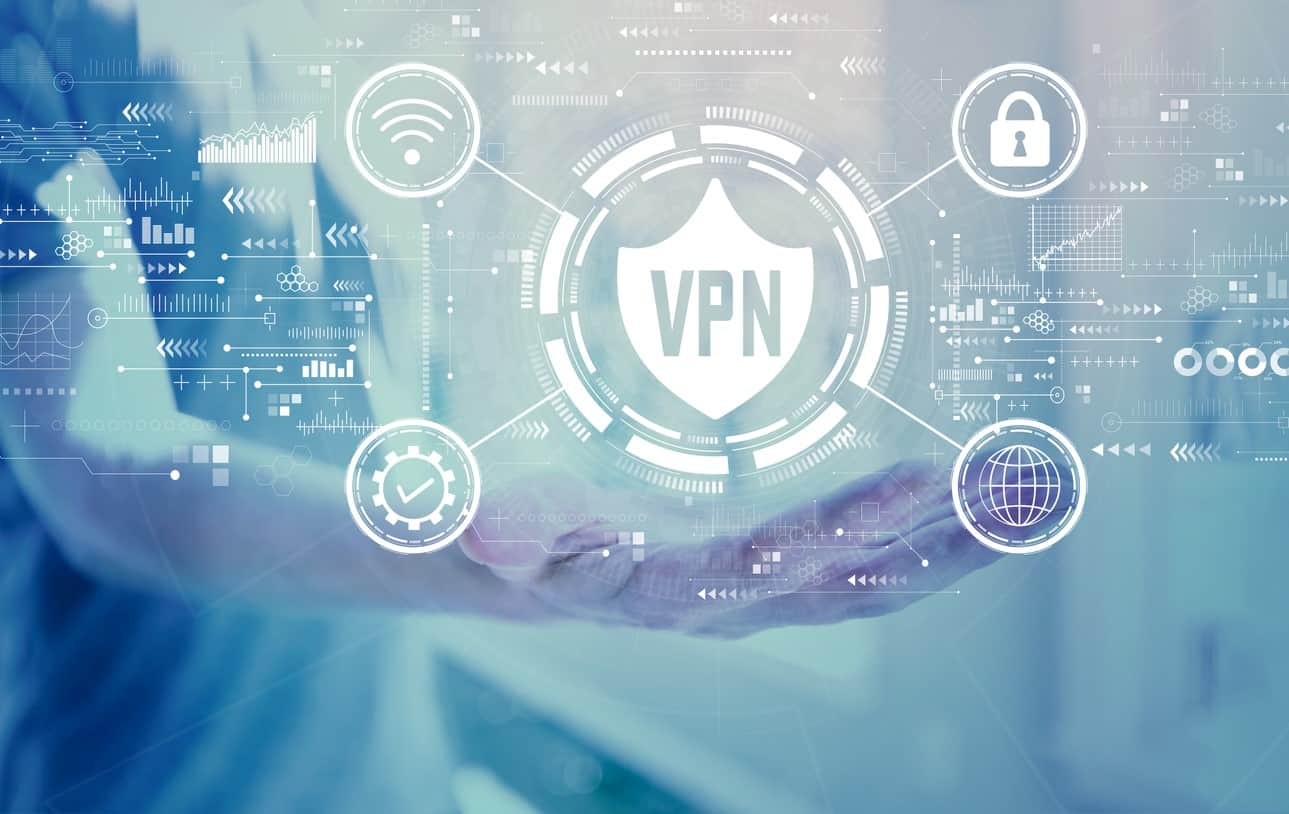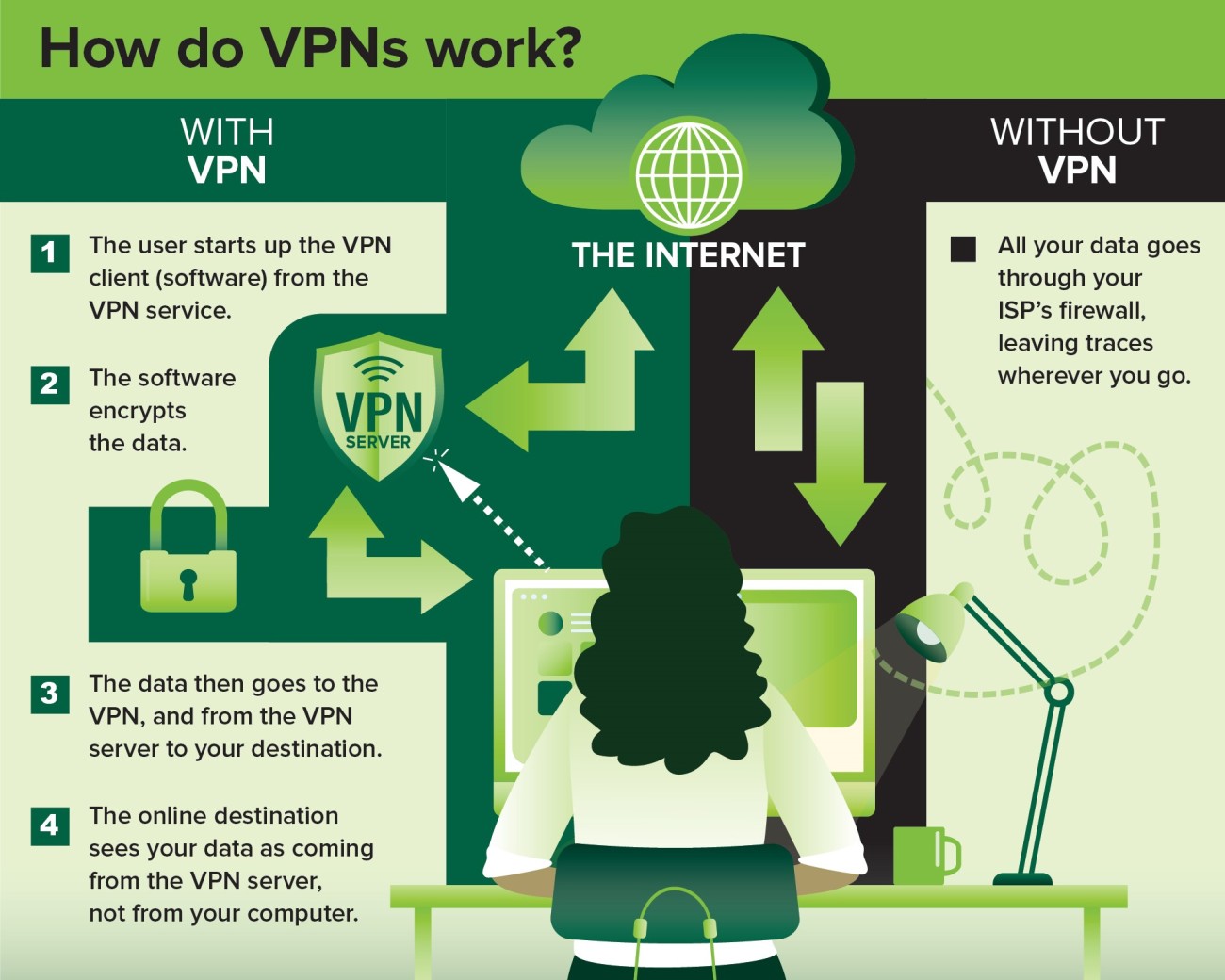
Most will know that VPN stands for "virtual private network’ which, apparently, have been around for a long time, originally used by companies for remote access. A VPN creates an encrypted connection, called a "tunnel", that connects to a remote server operated by the VPN provider to route your internet traffic through the tunnel to the server, which then sends the traffic to the public internet as usual. In-coming traffic makes the same trip in reverse: from the internet to the VPN server, through the tunnel and on to your PC.
Concerned about my privacy I thought I’d do some research and decide whether I should get one. It’s not as straightforward as I thought, and I’m still undecided and I’d like your help in deciding.
I had thought that a VPN makes you anonymous online, but that is not the case. Using one makes it harder, but not impossible, to identify and track you and no VPN can provide total anonymity. But a good one can help protect your privacy – and some are better than others.
Everyone reading this has connected to FSB’s website via an internet service provider (ISP), such as BT Broadband or Plusnet, organisations that know all about what you do online. Everything. Even worse, they can sell your (anonymised) data to third parties. If you don't like that, using a VPN will help as it hides your true IP address and your ISP can only see the VPN server’s IP address.
This makes it harder, but not that much harder, for advertisers and others to track you online. So be aware, VPNs do not make you fully anonymous and advertisers and other unwelcome snooper – you know who I mean - have many ways to watch you, like trackers and cookies that a VPN alone can't do anything about.
Alarmingly, advertisers and more sinister monitoring sites can identify you through unique characteristics like browser version, screen size, and so on to form a unique signature— called a browser fingerprint.
And that’s just advertisers and good honest villains. The evil Establishment and the sinister Stasi-like Inquisition that is the British police are worse, for ever trawling around the internet looking for political opponents and truth-tellers to silence – and they have access to even more advanced and invasive techniques. Given enough time, a determined, well-funded snooper can usually get what it's after, even if you use a VPN.
But if they are just idly trawling, looking for random rebels, they might just move on if you’ve got a VPN and go after easier fish to catch. But if they are after YOU specifically, if they are looking for John Bull and want to destroy him as they have tried to destroy the lives of Katie Hopkins, Tommy Robinson and more, they have the means to find you and eventually will.
Moving on from that enemy of mankind, the British State, it is also the case that a VPN will only provide limited protection against threats like malware, social engineering scams, and phishing sites. Some VPNs say that they include some form of protection against malicious files and more and more include dedicated antivirus tools. Conversely, some security companies offer VPNs as part of their security programs - but would you trust them not to hand your data to the police?

But there are better ways to address these threats. Most browsers now have tools for detecting phishing sites, as do most antivirus suites and I understand that Windows itself is now very good at blocking unwelcome visitors. And of course, self-help is essential: do not reuse or use weak passwords and get a password manager to generate and store unique, strong passwords for each site and service you use. Verify who you’re talking to at all times. Never fall for the ‘I’m your son and need £100 for an emergency!’ Finally, protect your online accounts and enable multi-factor authentication whenever available.
In general, the more a VPN protects your privacy, the more it interferes with your regular browsing activity as performance trade-off can be high. The greater the privacy you get, the slower your connection becomes, but it is unlikely to be too much of a problem if all you are doing is reading FSB and watching Youtube or films on Netflix. If you are downloading massive files however, you might face significant delays.
I’m routinely impressed by the intelligence and of ingenuity of FSB readers, so it could be that some of you might get up to torrenting from time to time. Now torrenting is perfectly legal, but I’ve heard tell that there are cunning coves out there who download stuff like copyright protected films, which is, of course, illegal.
If you are a torrenter you almost certainly know more about these things than I do, but for anyone contemplating torrenting, be aware that while using a VPN prevents your ISP seeing the sites you visit and what you down and upload, you might find yourself in trouble if your ISP, or a copyright troll, takes an interest in your torrenting as even with a VPN, they will be able to see that a lot of data is being transferred. That’s alright if you have a large/unlimited data cap, but punishments range from throttled internet speeds for downloading too much to legal action for copyright infringement. Also, as torrenting relies on uploading what files you have while downloading what’s left, if caught you will be done for distribution of copyrighted material as well as possession.
With a VPN, you can connect to a server in a different country and spoof your location. One of the ways to determine where an internet-connected machine is located is to look at its IP address. These addresses are distributed geographically. By hiding your true IP address behind the IP address of a VPN server, your location can be obscured, which can also get around local content restrictions and other kinds of censorship.
Streaming services sometimes offer different content in different countries due to licensing agreements in each region. For example, UK residents might be able to watch Star Trek Discovery on Netflix, while US residents would need to use Paramount+. Using a VPN allows you pop over to a faraway VPN server, perhaps to access streaming video unavailable in the UK.
But remember that sites and services sometimes have other means of determining your location, such as cookies stored on your devices. Also, many sites are sensitive to changes in expected behaviour. If your bank sees someone claiming to be you connecting from Latvia, it may require them to do additional security checks before granting access. That's generally a good thing, but it can be annoying. But like government censorship, streaming services know many people use VPNs to access their content and actively work to prevent it.
And also, note that using a VPN and the encrypted traffic it produces might itself attract unwanted attention. Encrypting? You must have something to hide. Remember, no VPN can provide total protection.
And remember, ALL your traffic passes through a VPN, which is therefore in the same position as an ISP. It could, if it wished, see everything you do online, sell that data, or use it to identify you if ‘someone’ asks for it.
So, do you/I need a VPN?
Previously, VPNs were more easily identified as a jolly good thing, back in the day when web data went by HTTP, usually without encryption. Today, most traffic is via HTTPS, which is encrypted. But even so an ISP or someone spying on you can still see your traffic's destination, even if it's HTTPS. And as shown, advertisers have become more sophisticated, with browser fingerprinting and cookie storage to circumvent a VPN. Even a VPN’s ability to spoof locations, bypass censorship, and unblock streaming is less certain as companies and governments have become increasingly aggressive in detecting and blocking VPN traffic.
So, in the end, it all depends on why you need or want a VPN. If you want your traffic to appear to be coming from another country, a VPN will do that. If you want to make it a little harder for advertisers and others to track you as you move across the web, a VPN can help do that too. And if you want to ensure your ISP knows as little about your online activity as possible, a VPN will help there too.
So, in FSB’s admittedly imperfect opinion (though this article has been run past the highly knowledgeable next generations of Armstrongs) getting a VPN isn't a perfect solution, but it's still a powerful tool to protect your privacy online, and a valuable part of your toolkit. And like all tools, it works best when you use it for the right job.
One of that next generation has used a VPN for many years, Mullvad, and is very happy with it. It scores very high on the privacy protection count, though some say it can generate those annoying captcha thingies, where you have to tick boxes that have traffic lights. But it only costs five euros a month and does not require any identification, or even an email address. I am told that you just get a number from them, and can even write it on a five euro note and send it to them in Switzerland and that is enough to activate your account, though I suppose there are other ways for those wanting five euro notes……………..
Others I’ve spoken to say reasonably good things about NordVPN and Surfshark. There may still be a Black Friday deal for NordVPN. There is also a potential to get cashback via Quidco.
As I said at the beginning of this piece, I’m still undecided, though slightly leaning to getting one. Please help me make my mind up by letting me know what you think in the comments, and by voting in the poll below.